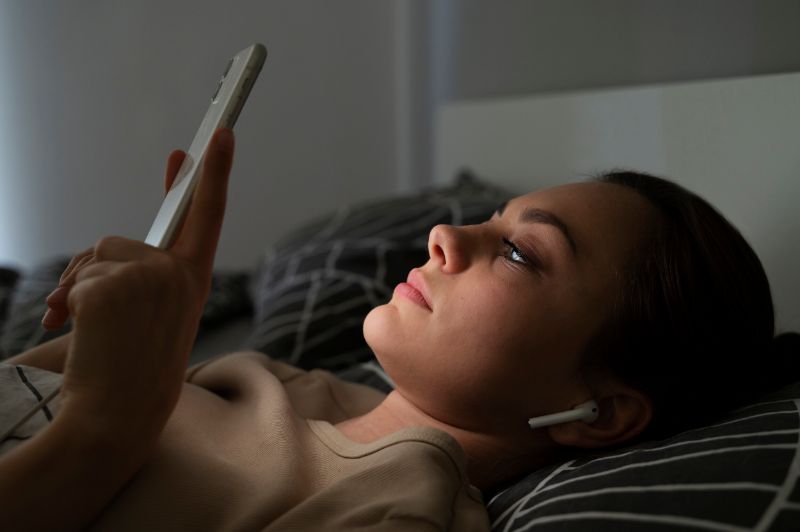To sleep better at night, you must make your bedroom a sanctuary.
It's not just about the overall look and feel of your space—the right lighting, temperature, and decor can help you fall asleep faster and stay asleep longer. But other things can be done to help you get the restful night's sleep you deserve.
One of them is avoiding screens before bedtime. A study conducted by researchers at Harvard Medical School found that people who used their phones late at night were more likely to wake up in the middle of the night than those who didn't check them as soon as they went to bed.
If you need something on your phone at night—like a quick recipe or a reminder about a meeting—don't use it as an excuse to keep returning for more information after lights out!
What Can You Do to Sleep Better at Night?
Sleeping is a vital part of life. But it can be hard to get a good night's sleep when you're stressed or have anxiety.
We've put together a list of easy ways to improve your sleep, so you can get more out of the time you spend in bed—and get yourself feeling better, too!
- Reduce your caffeine intake. Caffeine can keep you up at night because it's a stimulant, and an energy drink may contain more than one cup of coffee, equivalent to two cups of regular coffee!
- Avoid watching television before bedtime, especially if it contains violent content.
- Avoid drinking alcohol before bedtime—it may keep you up all night!
- Exercise regularly throughout the day—this helps regulate your body's natural rhythms to coincide with your sleep schedule, which helps induce sleepiness at the appropriate nighttime!
- Set the right environment. When you're sleeping, make sure the room is at a comfortable temperature (not too hot or too cold), and try to block out as much noise as possible. If you're sharing a room with someone else, ensure no blankets or pillows are blocking their way. Also, don't drink any caffeine after noon. That means no energy drinks or coffee (or energy shots)!
How an At-Home Sleep Study Can Help You Sleep Better
An at home sleep study is a great way to get a better night's sleep. You'll be able to see how your sleep habits compare to others, which can help you find out what's stopping you from getting a good night's rest.
You might discover that the problem isn't with your bed but with how much time you spend on it. Or you're not getting enough restful sleep because of an outside source like stress or a late night at the office.
A home sleep study is also an excellent option to learn more about your health. You may want to know if any underlying medical issues could affect your ability to fall asleep or stay asleep—or if any behaviors could help improve those outcomes.
A recent study shows that people who consult doctor online for sleep problems are much more likely to get positive results than those who don't. And the researchers say it's because doctors have access to special tools that let them do a better job of figuring out what's happening.
The study looked at 1,500 patients with insomnia and found that only half of those who didn't seek help with their sleep problems got any positive results. But when the doctors tried using these special tools—like monitoring brain waves or doing blood tests—the results were much more positive: 78% of patients who received these tests showed improvement in their condition.
How a Home Sleep Apnea Test Can Help You Sleep Better
The home sleep apnea test is a simple, non-invasive test that measures the air in your throat when lying down. One way to do it is with a nasal cannula (which looks like a large nose plug). You'll need to bring the nasal cannula to your doctor's office, and they'll give you instructions on how to use it.
You'll be told to lie down and close your eyes for 10 minutes without moving or speaking. While lying down, watch for any signs of air coming out of your mouth—like feeling tired or lightheaded when breathing out, feeling tightness in your throat, or having trouble swallowing saliva or food. It shouldn't take more than 15 seconds for these symptoms to appear. If they appear within 15 seconds of lying down, consider getting checked out by your doctor!
Conclusion
If you're looking for ways to improve your sleep quality, you've come to the right place.
With SleepRx, you can find Florida sleep specialists and insomnia treatment online. In addition to helping you get better sleep, we have sleep medicine doctors who can identify what's causing your sleep problems and help you develop a plan to solve them.
We know how difficult it is to get a good night's rest, especially when you're worried about your health or the health of someone else in your life. That's why we want to help—we want you to sleep well so that you can be better at everything else in your life too!












